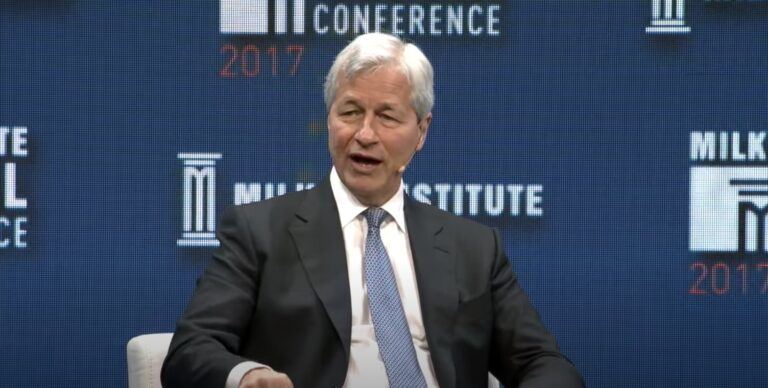In what he claimed would be his last words on CNBC about Bitcoin, JPMorgan CEO Jamie Dimon served his most ferocious attack ever on the flagship cryptocurrency at Davos 2024 in Switzerland.
Dimon shared with CNBC’s “Squawk Box” his thoughts on a range of topics, including his meeting with Ukrainian President Volodymyr Zelenskyy, geopolitical issues, doing business in China, the state of the economy, the 2024 US presidential race, cryptocurrency, commercial real estate, and more.
Meeting with President Zelenskyy
Dimon talked about his meeting with Ukrainian President Volodymyr Zelenskyy. He discussed the ongoing crisis in Ukraine and the geopolitical implications. Dimon emphasized the importance of supporting Ukraine during these challenging times and the broader impact of the conflict on global stability.
Geopolitical Issues and China
Dimon addressed the most pressing geopolitical issues, including the complexities of doing business in China. He highlighted the need for a balanced approach in international relations and trade, considering the economic interdependencies and political nuances.
State of the U.S. Economy
Discussing the economy, Dimon provided his perspective on the current economic climate in the US. He touched upon various factors influencing the economy, including inflation, interest rates, and government policies. Dimon also shared his views on the potential economic scenarios for 2024.
2024 US Presidential Race
Dimon briefly commented on the upcoming 2024 US presidential race. He discussed the political landscape and its potential impact on economic policies and business environments.
Blockchain Technology and Cryptocurrency
Dimon also expressed his views on Bitcoin and the broader cryptocurrency market. He reiterated his skepticism about Bitcoin, advising personal caution in dealing with it. Dimon acknowledged the technological advancements in blockchain but remained critical of Bitcoin’s utility and potential risks.
His views on blockchain and crypto could be summed up as follows:
- while blockchain technology is good, cryptocurrency that has no “real” use case other than speculation and for illicit purposes is bad;
- he does not like and does not own non-productive assets (i.e. those that do not generate income) such as gold or Bitcoin;
- he thinks of crypto as falling into one of two groups: (1) blockchains that support smart contracts and can be used for real-world asset tokenization; (2) cryptocurrencies that have no intrinsic value and that are mostly used just for speculation (or for illicit purposes);
- there is no way to know what will happen once 21 million bitcoins have been mined, at which time Satoshi might suddenly pop up, laugh, and then disappear, and at that point, all bitcoins in existence might get erased;
- people are free to do what they want with Bitcoin — at least for now — but his personal advice for everyone is to leave it alone; and
- if nefarious use cases of Bitcoin are not “solved” in some way, the U.S. government might need to ban it
Commercial Real Estate
The conversation also covered the topic of commercial real estate. Dimon discussed the current state of the real estate market, considering factors like remote work trends and economic conditions. He shared insights into how these factors are reshaping the commercial real estate landscape.
Dimon appeared on Fox Business’s “Mornings with Maria” on January 10. Hosted by Maria Bartiromo, the interview covered a range of topics, including leadership succession at JPMorgan, the U.S. economy’s prospects, banking regulations, and Dimon’s perspective on cryptocurrencies.
Leadership Succession at JPMorgan
Dimon addressed the topic of his successor, noting that the decision rests with the board. He mentioned that several potential candidates are being considered, emphasizing the need to select the most suitable individual for the role, without bias towards gender. He commended both the senior women and men at the firm while dismissing the notion of a public competition for his position.
2024 U.S. Economic Forecast
Regarding the U.S. economy, Dimon expressed greater concern over geopolitical tensions than immediate economic challenges, highlighting their significance for Western democracies. He pointed out that while consumer finances appear robust, the surplus funds from pandemic relief measures are dwindling. Dimon was skeptical of an overly optimistic economic scenario and raised the possibility of a recession, mild or severe, influenced by factors like interest rates, the cessation of quantitative easing, and government deficits.
Federal Reserve Policies and Inflation Concerns
Discussing the Federal Reserve’s interest rate strategies, Dimon expressed doubts about the market’s anticipation of rate reductions. He identified several elements, including fiscal deficits and international events, that could contribute to inflation, drawing parallels to the economic conditions of the 1970s. He stressed the importance of being prepared for potential shifts in economic trends.
Banking Regulations and Capital Requirements
Dimon critiqued new banking regulations that mandate higher capital reserves for major banks. He argued that these rules could impact various financial services, from mortgages to small business lending. He expressed concerns about the competitive disadvantage for U.S. banks, which are required to hold more capital compared to their international counterparts. He labeled some aspects of these regulations, such as operational risk capital and GSIB, as nonsensical and counterproductive to diversification.
Perspective on Bitcoin and Cryptocurrency
Reiterating his critical view of Bitcoin, Dimon pointed to its alleged association with illegal activities like tax evasion. He argued that Bitcoin’s primary applications extend beyond mere transactions to more illicit uses. Questioning Bitcoin’s intrinsic value, he suggested that, were he in a governmental position, he would consider shutting it down due to its potential misuse.









